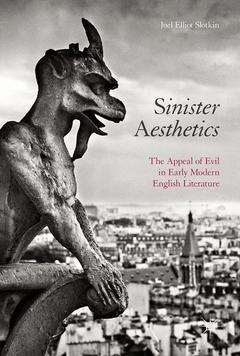Description
Sinister Aesthetics, Softcover reprint of the original 1st ed. 2017
The Appeal of Evil in Early Modern English Literature
Author: Slotkin Joel Elliot
Language: English
Subject for Sinister Aesthetics:
Approximative price 105.49 €
In Print (Delivery period: 15 days).
Add to cartPublication date: 07-2017
Support: Print on demand
Approximative price 94.94 €
In Print (Delivery period: 15 days).
Add to cartPublication date: 08-2018
Support: Print on demand
Description
/li>Contents
/li>Biography
/li>Comment
/li>
This engrossing volume studies the poetics of evil in early modern English culture, reconciling the Renaissance belief that literature should uphold morality with the compelling and attractive representations of evil throughout the period?s literature. The chapters explore a variety of texts, including Spenser?s Faerie Queene, Shakespeare?s Richard III, broadside ballads, and sermons, culminating in a new reading of Paradise Lost and a novel understanding of the dynamic interaction between aesthetics and theology in shaping seventeenth century Protestant piety. Through these discussions, the book introduces the concept of ?sinister aesthetics?: artistic conventions that can make representations of the villainous, monstrous, or hellish pleasurable.
Provides a literary-historical narrative of the poetics of evil, which previous scholarship has not yet treated in a sustained and systematic way
Offers a new perspective on the relationship between elite and popular culture and the literary and cultural significance of monstrous births and bodies
Analyzes a wide range of early modern writers including Shakespeare, Milton, and Spenser




